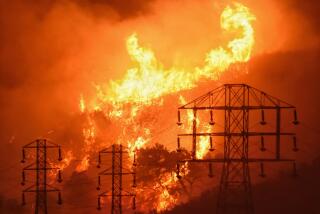High Utility Rates Trample the Poor
The noise being generated in Washington and Sacramento over who is to blame for California’s energy crisis brings to mind the adage that when hippos begin to fight, it is the ants who should worry.
I work with a health care/social services agency that receives numerous calls from people asking for help with their electricity, gas and water bills. Increasing prices and the burden of a utility users’ tax are making it impossible for people who are poor or who live with an illness to pay rent, buy food and medicine and pay for utilities.
Of course our state and our nation need a better energy policy that includes both short-and long-term plans to make us energy-efficient and self-sufficient in a manner that protects the environment. But the shouting between the two giant political parties as they try to affix blame isn’t solving the problems for the ants among us--the poor and sick who will be uniquely affected by a power shortage.
While we are developing an energy policy, what do we do for them? When our summer heat comes, how will these people cool their apartments to prevent becoming dehydrated or keep their food refrigerated? In the winter, how will they keep warm? The lack of utilities (either because of cost or a “blackout”) will be a potential medical emergency for those who have health care conditions requiring heating and cooling to regulate their body temperature or energy to operate medical equipment.
We must respond to this looming public health crisis. Utilities must work with local health officials and paramedics to identify and assist disabled and medically fragile residents who would be seriously impacted should they not have access to sufficient electricity, natural gas or water services. Until energy is sufficient and rates reasonable, we need to plan for this local community disaster in the same way we have done for earthquakes.
Assistance with payment of utility bills needs to be increased for low-income seniors and people with disabilities. While California requires public utilities to provide a 15% rate reduction for low-income customers through the California Alternative Rates for Energy program, municipal utilities were exempted from CARE. The city of Long Beach provides only a 5% discount to low-income seniors and disabled customers. The poor who aren’t old or disabled get no assistance.
In addition to the CARE program, the state provides some assistance for heating and cooling bills through the Low Income Home Energy Assistance Program. This is simply not enough for most low-income people, who are being hit the hardest by rising utility bills.
One solution would be for communities with municipal utilities to do what some utilities do already: allow customers to voluntarily contribute to special funds to pay for others who can’t afford the rates. A possible model is Seattle’s Project Share, in which utility customers can specify an amount to be added to their electric bills or can make one-time donations. Contributions are tax-deductible and are matched by the city of Seattle.
Finally, many cities in California have imposed a utility users tax as high as 10% on these services. As the utility rates soar, so does the amount of tax generated from these rates, providing cities with a windfall. In most cities, only low-income seniors and low-income disabled are exempt from the utility users tax. Perhaps cities could designate a portion of their windfall to assisting the poor. We need to stop the fighting and get together to work on the solutions--quickly.
More to Read
Sign up for Essential California
The most important California stories and recommendations in your inbox every morning.
You may occasionally receive promotional content from the Los Angeles Times.










